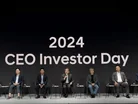Hyundai's 2024 Strategy: Mobility & Energy Leadership

In a significant move to solidify its position in the global automotive industry, Hyundai Motor Company revealed an expansive new strategy titled the 'Hyundai Way' at its 2024 CEO Investor Day.
The strategy outlines its comprehensive approach to addressing future market challenges and driving innovation in the automotive and energy sectors.
Expanding Electric Vehicle Lineups
One of the critical pillars of the 'Hyundai Way' is the expansion of Hyundai's hybrid and EV lineups.
Under its new Hyundai Dynamic Capabilities strategy, Hyundai Motor plans to double its hybrid offerings from seven to 14 models, including new options in its luxury Genesis brand.
In addition, it will introduce the next-generation TMED-II hybrid system, which aims to enhance performance and fuel efficiency significantly.
Addressing EV Market Challenges with EREV
In response to the slowing demand for EVs, Hyundai is developing a new Extended Range Electric Vehicle (EREV) that combines the benefits of internal combustion engines (ICE) and electric vehicles.
The EREV operates primarily on electricity, with the engine used solely for battery charging, offering a driving range of over 900 km.
It expects the new model to bridge the gap between traditional vehicles and full EVs, providing an attractive option for customers transitioning to electric power.
The EREV will enter mass production by 2026, targeting key markets in North America and China, where Hyundai anticipates strong demand for this innovative vehicle.
By 2030, Hyundai plans to offer a full EV lineup of 21 models, ranging from affordable EVs to luxury and high-performance options, solidifying its leadership in the EV market.
Leading the Charge in Next-Generation Battery Technology
The strategy focuses on advancing its battery technology to maintain its competitive edge. It plans to introduce a new, cost-effective NCM battery, alongside ongoing developments in solid-state batteries.
Hyundai's commitment to battery innovation highlights its investment in a new battery research facility at its Uiwang Research Institute, set to open in late 2024.
Safety is a top priority in Hyundai's battery strategy.
The company is enhancing its Battery Management System (BMS) technology to detect and address minor battery abnormalities in real time, ensuring safer and more reliable EVs.
Autonomous Vehicles and Software-Defined Vehicles
The 'Hyundai Way' strategy emphasises its transition towards Software-Defined Vehicles (SDVs) and autonomous driving technologies.
It is developing a Zonal Electric-Electronic (E/E) architecture, which simplifies vehicle systems and accelerates the deployment of new features.
Hyundai plans to launch its first SDV Pace Car by 2026, equipped with a High-Performance Vehicle Computer (HPVC) architecture, enabling faster and more stable autonomous driving capabilities.
Hyundai is further venturing into the autonomous vehicle foundry business, aiming to supply autonomous vehicle platforms to global partners.
The initiative will leverage Hyundai's expertise in autonomous driving, developed through partnerships with companies like Motional.
Expanding Hydrogen Energy Initiatives
Hyundai's commitment to sustainable energy is evident in its plans to expand its hydrogen fuel cell system lineup under its HTWO brand.
The company is targeting broader hydrogen applications, including advanced air mobility, heavy equipment and maritime transportation.
Hyundai's innovative hydrogen production methods, such as Waste-to-Hydrogen (W2H) and Plastic-to-Hydrogen (P2H), highlight its dedication to leading the global energy transition.
Financial Commitment to Innovation
To support the strategy, Hyundai Motor announced a 10-year investment plan totalling US$90bn (KRW 120.5tn).
The investment includes significant allocations for research and development, capital expenditure and strategic acquisitions.
Hyundai's financial strategy includes enhanced shareholder returns, with a minimum annual dividend of US$7.49 (KRW 10,000) commencing in 2024.
*******************
Make sure you check out the latest edition of EV Magazine and also sign up to our global conference series - Sustainability LIVE 2024.
*******************
EV Magazine is a BizClik brand.


